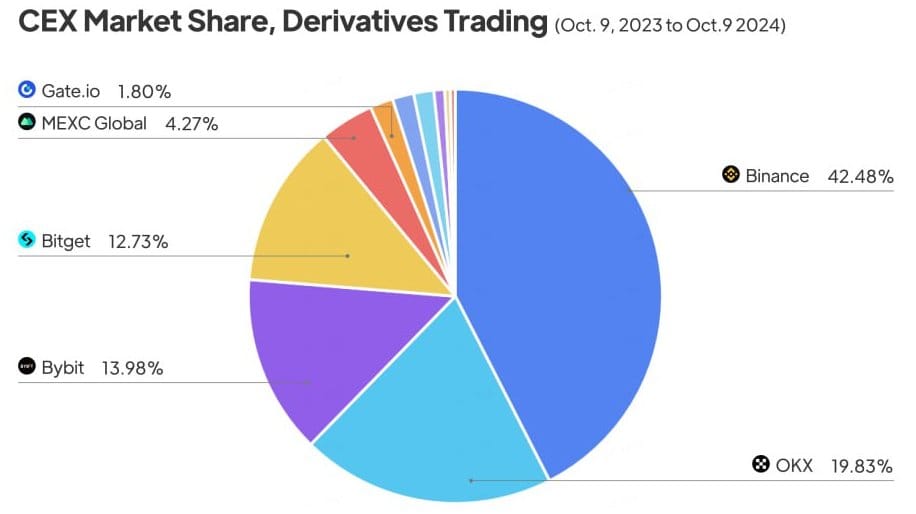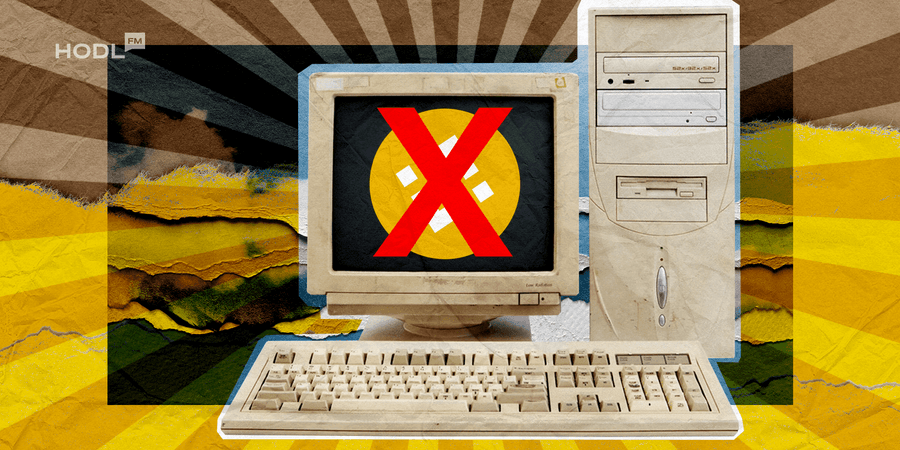The world’s largest cryptocurrency exchange, Binance, saw a significant decline in spot trading volume over the past year following a year of legal turmoil which saw it lose ground to smaller rivals and decentralized exchange (DEX) alternatives.
Binance underwent a 13% decline in the twelve months between Oct. 2023 and 2024 as its 52.5% market share dropped to 39.5%. During the same time period, Binance also saw its cryptocurrency derivatives market share decrease by 8.4%, falling from 50.9% to 42.5%, according to a report by 0xScope.
Binance continues to lose share on the spot market: share has fallen from 52.5% to 39.5% in a year - 0XScope data pic.twitter.com/hAwXn83mBf
— NekoZ (@NekozTek) October 22, 2024
Several smaller cryptocurrency exchanges benefitted from Binance’s failing fortunes, including the No.3 ranked exchange by trade volume, Bybit, which more than doubled its market share from 3.2% to 8.1%. Likewise, the No.4 ranked exchange, OKX, increased its 5.4% market share to 6.38%.
The No.8 ranked crypto exchange, Bitget, saw its market share increase by almost 50% over the course of the year, climbing from a modest 7% to now control 10.28% of the spot market. Bitget, which launched in 2018 and offers spot, derivatives and copy-trading features, may have benefited from high-profile commercial partnerships with the likes of Italian football giants, Juventus, and global soccer superstar, Lionel Messi.
Binance’s declining trade volume appears even more drastic when observed on a two-year timescale — the exchange still held a dominant 62% market share in Oct. 2022, meaning Binance’s market dominance dropped by 36% in just two years.
Crypto Traders Flock to Decentralized Exchanges
Decentralized exchanges (DEX) differ from their centralized counterparts like Binance and Coinbase by facilitating trades in an anonymous, permissionless manner, where trades are executed wholly on-chain and users retain custody of their own funds at all times.
DEX trade volumes more than doubled from $61 billion in Oct. 2023 to over $150 billion by Oct. 2024, with platforms like Raydium, Uniswap and PancakeSwap processing the lion’s share of trade volume. The dramatic rise in DEX trade volume is even more marked considering they processed little over $600 million worth of trades in July 2020, as per data from DeFiLlama.
The steady increase of DEX trade volume year-on-year may signify that more cryptocurrency users are becoming familiar with the intricacies of blockchain technology.
Whereas centralized exchanges like Binance provide a smoother, more streamlined user-experience for everyday users, their proprietary nature means users give up control of their funds when trading, and essentially must trust the company to honor its promises.

Meanwhile, DEXs allow traders to retain control of their own funds and operate in a trustless, permissionless manner, however the added responsibility this places on users can prove too much for newcomers to the crypto and blockchain space, who may initially lack technical knowledge.
Decentralized platforms may also have benefitted from the rise of the memecoin market over the course of the past year — a market now worth a combined $74 billion according to data from CoinGecko. Due to their open nature, DEXs are more willing to list memecoins than centralized exchanges, which often have concerns over legal liabilities.
Binance’s Legal Difficulties
The loss of over one-third of its market share in just two years coincides with Binance’s mounting legal battles, which resulted in the replacement of long-term CEO and founder, Changpeng Zhao, known as CZ.
In June 2023 Binance was hit with a lawsuit by the U.S Securities and Exchange Commission (SEC) which alleged that Binance and its then CEO, CZ, had misappropriated billions of dollars in user funds.
Binance was charged with violating United States Anti-Money Laundering laws, and eventually came to a settlement with the SEC which saw it pay $4.3 billion — one of the largest criminal fines in history. Meanwhile, CZ himself was ordered to pay a fine of $50 million, and stepped down as CEO of Binance, being replaced by the company’s former Global Head of Regional Markets, Richard Teng.
Zhao was given a four-month prison sentence for failing to implement adequate anti-money laundering controls at Binance and was released in Sept. 2024.
Ever-Changing Crypto Exchange Landscape
Ultimately, the crypto exchange landscape is highly reactive to ongoing developments such as token listings, market news, and legal disputes.
The rise of decentralized exchanges and growing technical knowledge among crypto users presents yet more competition for centralized juggernauts like Binance, which, along with other major centralized exchanges, has since launched its own DEX, giving users the options to trade on an open-source, non-custodial platform.
With ongoing developments to expand its breadth of listings and features, and a greater willingness to serve the memecoin market than other centralized exchanges, it’s difficult to see Binance giving up its No.1 market share any time soon.
In the two months following Binance’s $4.3 billion settlement with the SEC, the platform’s market share increased by 49%, suggesting that even major legal difficulties can’t dent its popularity among crypto traders.

Disclaimer: All materials on this site are for informational purposes only. None of the material should be interpreted as investment advice. Please note that despite the nature of much of the material created and hosted on this website, HODL FM is not a financial reference resource and the opinions of authors and other contributors are their own and should not be taken as financial advice. If you require advice of this sort, HODL FM strongly recommends contacting a qualified industry professional.




